Looper (or loop) pedals are one of the most underrated guitar effect pedals out there. Even though they’re quite easy to use, some musicians have never developed a habit of using them, others think they’re too “risky” for their style (you have to be very precise when using them in most cases) while there are some musicians who never even got to try one.
Click Here to Jump to The 5 Best Guitar Looper Pedals.
Truth be told, it’s safe to say that you could pull on a show without a looper, but you’d come short on a completely different experience – there are so many things you could do with a loop pedal, and they could only improve your playing style and performance, not to mention they’re quite “crowd warmer”. In this article, we’ll talk about what looper pedals are, what makes the best looper pedals, review some of the finest models, and put together a small “buying guide” for newbies. Without further ado, let’s get straight to it.
What are Looper Pedals and How Do They Work?
In essence, a looper pedal is used to record specific passages of sound waves that are stored on the pedal’s software for later use. Depending on the model, you’ll be able to choose a number of passages which is different for each pedal.
The “saved loops” can be used when triggered to overdub even the newly recorded passages, allowing you to play with music as if it were a toy. Newer pedals allow you to alter the tempo of “loops”, the direction, and other aspects of sound waves that other pedals can’t.
Complex versus simple – what type of looper pedal are you after?
The reason why you have to take the looper’s complexity into account is that there’s a learning curve – beginners are best off with simple loop pedals while seasoned musicians should consider complex models. If we’re to better understand the issue, we’ll need a good example.
For starters, TC Electronics Ditto looper pedal is a perfect example of a simple loop pedal. It doesn’t come with a vast array of switches and buttons, hence you’ll be able to figure out how it works in no time.
On the opposite end stands the Bosses RC-30 – a massive dual-track looper which is more of a station than it is a pedal. It features numerous little hardware pieces, and you’d feel as if you’ve been shipped on board a space shuttle if you’re an immediate beginner.
That being said, your skill level (with guitars and guitar tech)is one of the most important indicators of which loop pedal is the best one for you.
Benefits of Loop Pedals
Most people will tell you that a loop pedal is one of the most versatile guitar effect pedals out there, so it’s quite hard to pinpoint the exact benefits of owning one since there’s no limit to the things you could do with it. However, there are a couple of general advantages it offers:
Improve Your Songwriting Game
A songwriting process is always subjective and individualized, which basically means “whatever works will do”. Some people jam out on their guitar and once a solid riff pops up, they work on it and write it in their notebook, others work on tablature software (e.g. “Guitar Pro”), and some of the most committed musicians use every piece of their gear to make the perfect songs.
Regardless of which type of a songwriter you are, using a loop pedal could be very beneficial if you haven’t tried it out before. Baiting your muse out shouldn’t be too hard once you stack on a couple of chords and it’s safe to say that those “repetitions” won’t be an issue ever again.
Furthermore, you could use the looper pedal to mimic the lines of the other guitar, even the bass line if need be.
Improve Your Solos
Much akin to the improvement of your songwriting skills, your solo technique will receive a welcome boost once you start using a looper pedal. Simply record the rhythm and chords you want to lay some mayhem on and you’re set to go.
Most musicians use “backing tracks”. You could find any number of them online – nearly all music genres have at least a dozen backing tracks, all available in both major and minor tunings. Using a looper pedal could help you achieve the same effect without having to go online.
Dazzle The Crowd During a Live Gig
If you’ve tried out anything we’ve mentioned in the sections above, you already know how powerful a looper pedal might sound. Now, imagine putting that to the test on stage.
Live gigs are a cool way to show off your arsenal of skills, and the looper pedal could boost up everything you’ve done, and more. Like we’ve mentioned earlier, the looper is one of the most versatile pedals, and you couldn’t even start to imagine what it could do when combined with a delay, reverb, or a pitch shifter.
Work On Your Rhythm
One of the reasons why some musicians refrain from using loop pedals on stage is because these pedals pose a nasty risk – “you” could fall out of rhythm (it’s virtually impossible for a perfectly designed piece of machinery to be “wrong”, per se).
Knowing that some people completely scratch off the possibility of using a loop pedal, but we implore you to think otherwise. You could work on your rhythm on a completely different level.
Imagine the stored loops as perfect versions that need to be replicated. A loop pedal could bring you one step closer to knowing what it feels like to record your guitar – these sessions are (almost always) comprised of numerous rollbacks, edits, and repetitions, so you might as well start off learning early.
The 5 Best Guitar Looper Pedals:
Below we have listed and reviewed the 5 best guitar looper pedals you can currently buy online.
1. TC Electronic Guitar Ditto Looper Effects Pedal
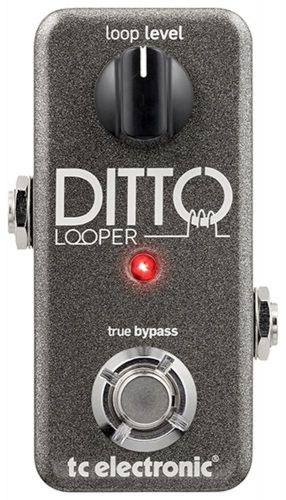
Let’s start off with TC Electronic’ Ditto Looper pedal. This brand is fairly impressive for a low-budget effect pedal, and it comes outfitted with an impressive feature outfit. The minimalistic design is practically ideal for beginners who are yet to get accustomed to this pedal type but don’t let that give you the wrong idea-it’s strong, reliable, and quite versatile. Most musicians who’ve used Ditto say that it works like a charm for home practice, although you’d feel a bit restrained in terms of options should you use it during a live show.
Design
TC Electronic’ Ditto is among the simplest looper pedals out there. In essence, it was designed in a plain and straightforward fashion, boasting a modest feature outfit. Looking from the top, there’s the loop level knob under which at the very center you can see the red LED on/off light. At the very bottom, there’s a convenient true bypass switch.
Features
TC Electronic’ Ditto features five minutes of total loop time – that might not be too much, but you’ll be able to overdub, redo, or undo your looped passages indefinitely. Now, the “true bypass” switch is what makes Ditto so awesome. This little feature allows you to simplify the pedal-switching process, solve certain chain-based problems, and reduce the “bleeding” effects from noisier effects in your signal chain.
Ditto works on 9V batteries (the ones that can provide 100 mA, at the very least), however, these do not come with the package.
Final Thoughts
Truth be told, TC Electronic is a remarkable brand and their reputation as such is only further cemented with the development of Ditto Looper. This is an exquisite, truly remarkable loop pedal which is as good as it is simple. It doesn’t cost too much, it offers quite a lot, but we can’t neglect the fact that some things could’ve been done better – the loop runtime, for one, isn’t exactly impressive, but it’s safe to say that this is the only flaw TC Electronic’ Ditto has.
2. BOSS RC-30 Phrase Looper Pedal
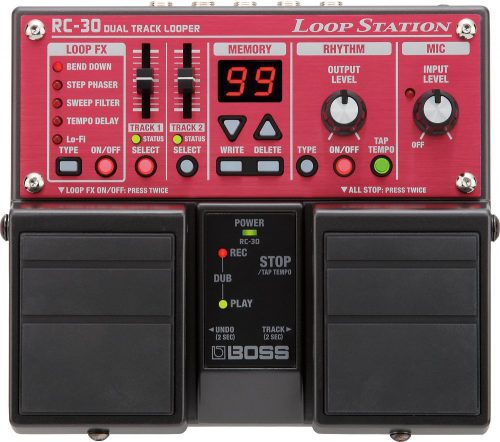
Boss is figuratively speaking the “Boss” of guitar gear and accessories. Jokes aside, this is a serious brand that is responsible for thousands of premium-quality guitar effect pedals, their flagships being the RC-50 and RC-300. Now, the reason why we’re introducing you to the RC-30 (which replaced the RC-20XL) is quite simple – this pedal is an improved version which boasts superb functionality and impeccable recording capability. Suffice to say, you’ll be able to utilize the plethora of functions it comes outfitted with without having to pay a fortune in turn (although it is quite pricey).
Design
The first thing that comes to mind when we take a look at Bosses RC-30 is that it’s a loop station, not your average loop pedal. What does that mean? Well, it’s big, it’s capable, and it allows you to customize every single aspect of your saved loops.
Basically, the RC-30 is comprised of two main clusters. Coming from the very bottom, the first cluster is comprised of two-loop pedals with the nicely lit control screen standing in between them. Both pedals work in the same way, it’s just that you’ll be able to use both nearly simultaneously should you be in need (comes in handy during live performances).
The second cluster is what makes RC-30 so complex. Namely, there are numerous buttons, sliders, and knobs, all of which can be used to further customize your looping needs. At the top right corner, you’ll see another control screen – it tells you which looping effect is “in effect”, including the bend down, step phaser, sweep filter, tempo delay, and Lo-Fi. At the bottom of it you’ll see a little “type” button which switches through them, the on/off button standing right next to it.
We’re going from left to right here – after the loop type selection panel is the first track. It features a neat little slider that works in the same way as Ditto’s “loop level” (the second track is the same). Right at the center you’ll see the write and delete buttons, with the selection arrows standing right above them. The “blank” black screen on top will show the number of your saved loop preset once you turn your RC-30 loop pedal on. Apart from that, there are two knobs – the output and input level turrets.
Features
The RC-30 features a massive internal memory which will allow you to benefit from a total of three hours of runtime. This twin pedal features a true-stereo I/O which is something that only a handful of models can boast of.
Furthermore, there are two separate, yet fully synchronized tracks that come with a set of dedicated faders, as well as easy to use select buttons. There are 99 onboard phasers for loop storage – that’s, perhaps, the best part of RC-30’s versatility.
Final Thoughts
Even though this magnificent looper pedal is quite complex, it’s among the best looper pedals on the market. Surely enough, it doesn’t come cheap, but it boasts a massive value for the cash. Once again, Boss made a point, and we don’t need to think too much about what it is – they make some of the finest pedals out there, and RC-30 is a true representative of their quality.
3. NUX Loop Core Guitar Effect Pedal
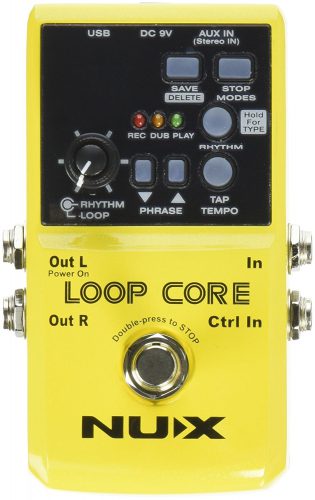
Compared to TC Electronic and Boss, NUX is a bit of an underdog, sure, but that doesn’t mean their pedals are bad – they’re simply a bit inferior since we’re comparing them to tech giants. Regardless, the Loop Core pedal has quite a few surprises here.
Design
The NUX Loop Core features a plain design, much like TC Electronic’ Ditto. At the top you’ll see two buttons – the “save/delete” and stop modes, both of which are quite self-explanatory. The rhythm button which can be seen right below the aforementioned two (you’ll see a little indication which reads “hold for type”).
Don’t mistake this button for rhythm level, the knob governs this sphere. You’ll see three lights on the right side of this button – the rec, dub, and play. They’ll tell you which mode you’ve selected. The only difference with this pedal is that you’ll see “phrase” instead of “modes” – these buttons are below the light indicators.
Features
NUX Loop core features 99 user-selectable memories, a dozen of built-in switchable drum patterns, and the tap tempo function. Even though it’s quite small, the Loop core features six hours of total recording time and allows you to record in both mono and stereo.
The brand boasts about this pedal being able to switch the phrases (musical passages) without noticeable latency – this means that you won’t experience static or sound interference on stage (again, this is perfect for live performance). You can connect your Loop core on 9V batteries or AC adaptor, but they don’t come with the package.
Final Thoughts
If we’re to compare NUX Loop Core with some of the best looper pedals on the market, it would appear as a mediocre one. However, we know that it belongs to the medium price point category, so it’s safe to say it holds tremendous value for the buck.
4. BOSS Audio RC-3 Loop Station Pedal
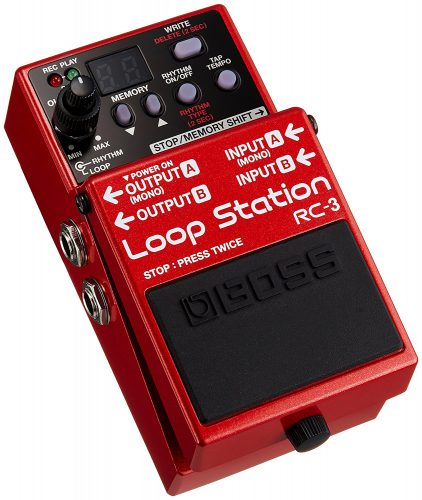
Here we have another amazing product from Boss – the RC-3 loop station. Now, the RC-30 has set quite a standard, so it’s safe to assume that this particular model has a lot of proving to do if we’re to label it as one of the best looper pedals.
Design
Boss RC-3 bares the same outward appearance as their usual stompboxes – the plain construction is adorned with a single pedal switch, two inputs, two outputs, a single level knob, two “memory” switches, rhythm, write, and tap-tempo buttons.
There are two LED lights – one shines with a vibrant red color once you start recording your passages, the other flashes with a green light once you play them. Apart from that, there’s the screen which tells you which preset you are using.
Features
Bosses RC-3 comes with a similar set of features when compared to the RC-30. It features up to three hours of recording runtime, a massive memory which can allow you to use up to 99 loops presets, realistic drumset guide, and more. There’s only one track, however, but it should do fine if you want to record your music or perform live. Just like any other loop pedal, this one operates on 9V Alkaline batteries (alternatively, you could use an AC Adaptor).
Final Thoughts
Bosses RC-30 costs twice as much as RC-3, but it’s safe to assume that both models are fairly great. Even though the latter might lack in certain departments of performance (versatility mostly), it’s still a great pedal for all kinds of musicians.
5. Electro-Harmonix 720 Stereo Looper Pedal
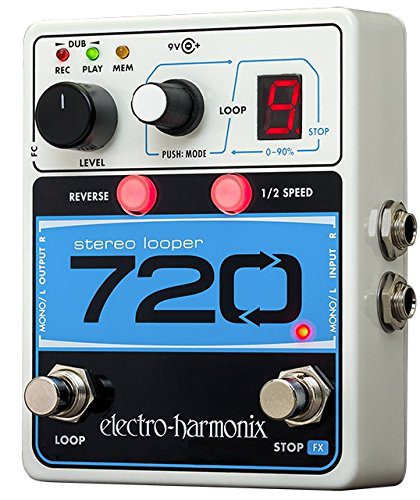
The last looper pedal in this review comes from Electro-Harmonix. This brand is one of the world-class leaders, sharing the throne with the big guys like Boss, Blackstar, and such. The 720 Looper pedal is pretty plain in nature, although there are certain things that make it look and perform in a unique way.
Design
Although exquisite, the design of the 720 looper pedal can’t be characterized as beautiful per se. It’s clear that the brand focused on functionality rather than aesthetics when they made it, as can be seen by simply taking a look at what it comes outfitted with.
The oversized level knob can be seen right underneath the Rec, play, and memory LED lights. At its right stand the loop mode knob and the loop phase indicator screen. There are two buttons which govern the direction and speed of loops (reverse and ½ speed), under which you’ll see the loop and stop buttons. Simply put, the construction of the 720 stereo looper pedal is all but complex.
Features
The performance of this looper pedal is quite great, but far from perfect. Namely, you’ll be able to utilize only 12 minutes of total runtime (whereas most loop pedals allow you to record hours of musical passages), and there are only ten loop phases (again, most high-quality loop pedals come with at least 50 or more).
On the brighter side, there’s the undo/redo button to clear any possible mistakes you’ve made, as well as the reverse button which substantially improves the level of versatility of this looper pedal. On top of that, you can use the ½ speed setting to slow down your passages, allowing for a broader range of sounds to be overdubbed across the root line.
The stereo in and out significantly enhances the usability of the 720 stereo looper, as you can record up to two instruments simultaneously. Another great thing is that this looper pedal comes with an AC Adapter as a complimentary feature. If anything goes awry, it works on 9V batteries if you misplace your adapter and find yourself in a tough spot (note, the batteries are not included with the package).
Final Thoughts
Electro-Harmonix’ 720 Stereo Looper is quite good for the buck, but it’s certainly not perfect. It’s a budget looper pedal designed for beginner musicians, as it features a meager amount of settings that are fairly easy to understand and use both during live performances or home recording/practice. It doesn’t cost a fortune, and it holds a great value for the money.
Conclusion
Finding the best looper pedal shouldn’t be that hard – the first step is understanding what they truly are, the second how they could be used, and it’s only the third step where you could actually consider buying one, lest you find yourself in a predicament.
What Is The Best Looper Pedal?
In our opinion, the best looper pedal is the Boss RC-30. It passed each performance test with flying colors, ranging from the authenticity and uniqueness of the design, over versatility, to plain aesthetics. It simply has it all, and it’s safe to say that every musician (regardless of the skill level) could find much use of it.
That, however, doesn’t mean that other loop pedals in this review are to be taken for mediocre models – each pedal is great in its own right. While some models can be characterized as the best budget loop pedal (Ditto, for example), we’ve also added the best runner-up (Boss RC-3), and so on.



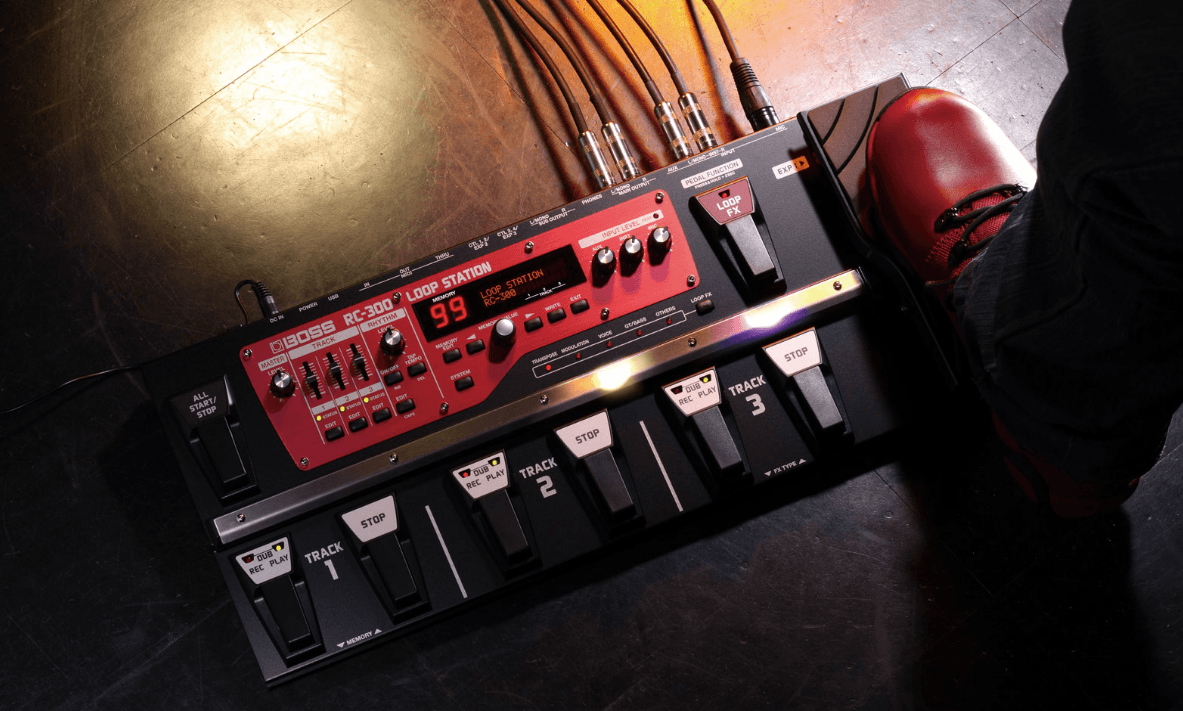

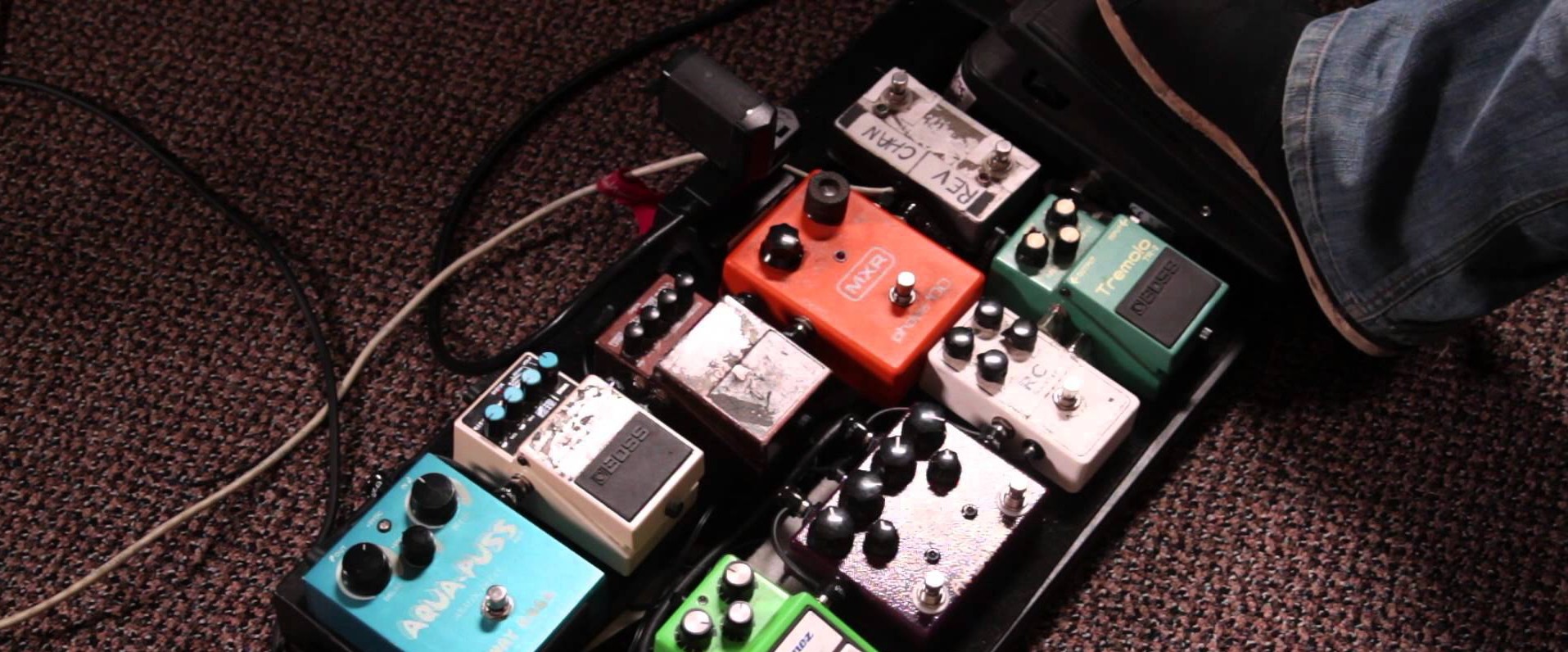

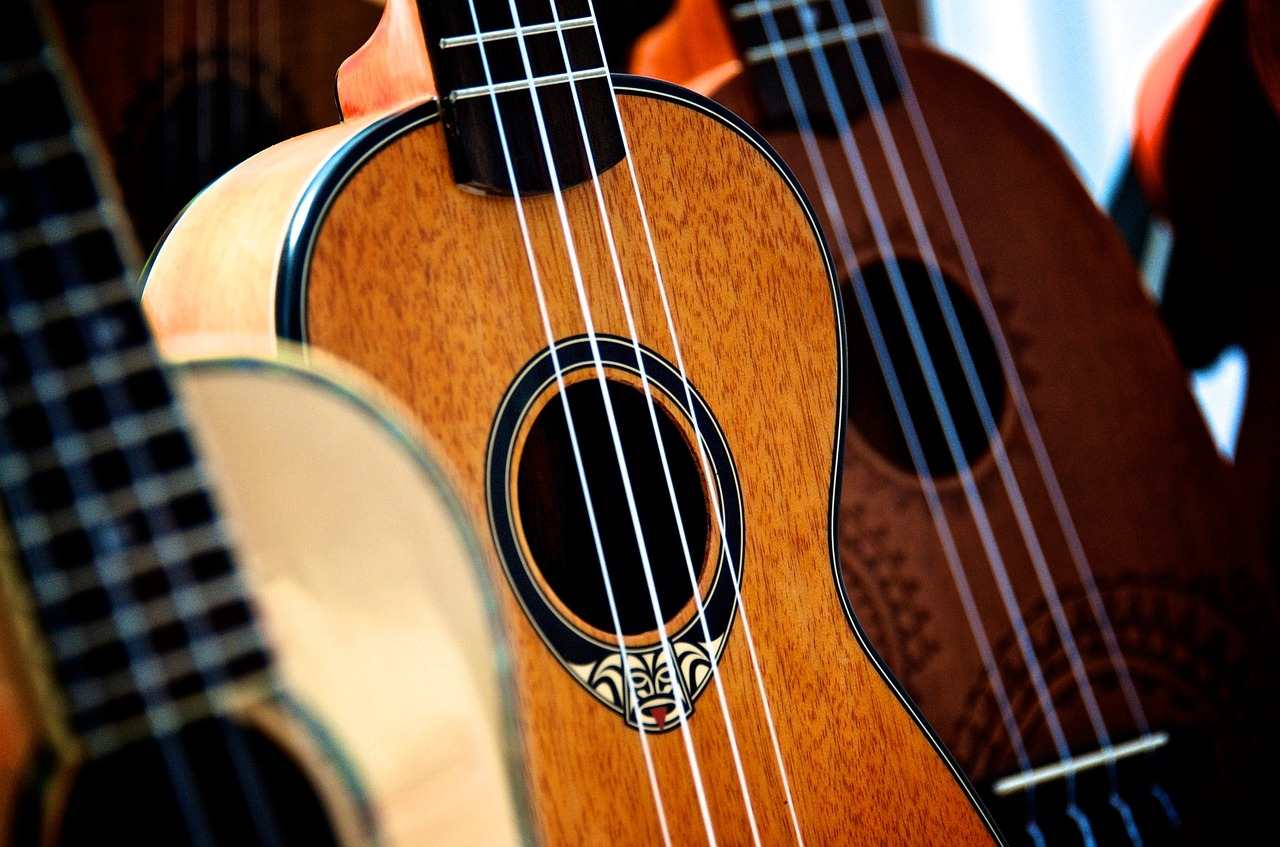




Add comment